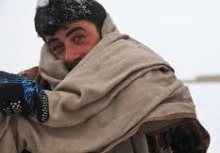The first step we are going to take in order to know the meaning of the term hypothermia is to discover its etymological origin. In this case, we can establish that it derives from Greek and that it is the result of the sum of three lexical components of said language:
-The prefix «hypo-«, which can be translated as «underneath».
-The adjective «thermos», which is synonymous with «hot».
-The suffix "-ia", which is used to indicate "quality."
Hypothermia is the medical phenomenon that occurs when the body temperature drops and falls below normal values . This is an involuntary drop below 35º C.
Staying outdoors for a long time in winter without having enough clothing, wearing wet clothing when it is very cold or there is a huge wind, falling into the cold waters of a river or lake, or even exerting a lot of effort in areas very cold are some of the causes that can cause someone to suffer hypothermia.
 Mild hypothermia occurs when the body temperature is between 35º and 33º C. In this case, the person feels confused, cannot make fluid or coordinated movements, and suffers from tremors.
Mild hypothermia occurs when the body temperature is between 35º and 33º C. In this case, the person feels confused, cannot make fluid or coordinated movements, and suffers from tremors.
When the temperature is between 33º and 30º C , we speak of moderate hypothermia . In addition to the symptoms already mentioned, the subject loses his memory and is almost unconscious.
If the temperature drops further and the thermometer reads less than 30º C in the body, the individual experiences severe hypothermia . With this condition, the heartbeat is very weak, blood pressure drops and there is no longer consciousness . The subject affected by hypothermia, in this context, runs a serious risk of dying.
There are also signs that may indicate that a baby is suffering from hypothermia. Specifically, the most common are that it has very little energy and that, in addition, its skin is very cold and it acquires a bright red color.
Hypothermia generally occurs when humans are in an extremely cold environment . To avoid it, you have to dress in warm clothes; especially protect the head, heart, feet, hands, ears and nose; eat caloric foods; maintain hydration; No smoking; and avoid alcohol consumption.
In addition to everything indicated, we must know that those who are most likely to suffer hypothermia in the face of adverse conditions are people who suffer from some type of chronic illness, those who are very tired, individuals who are very young or very old, those who are are under the influence of drugs or alcohol, people who are malnourished and those who are taking any type of medication.
Given the lack of food and shelter , homeless people who are homeless are prone to hypothermia. That is why it is very important to provide them with assistance during the winter.
To treat hypothermia and reverse it, the person must be moved to a warm, closed environment . If that is not possible, it is important to cover her with blankets to insulate her from the cold ground and protect her neck and head to retain body heat.
Applying warm compresses to the chest, groin, and neck also helps, but sudden movements and friction should be avoided because heat can be directed from the center of the body to the muscles, a counterproductive situation.
